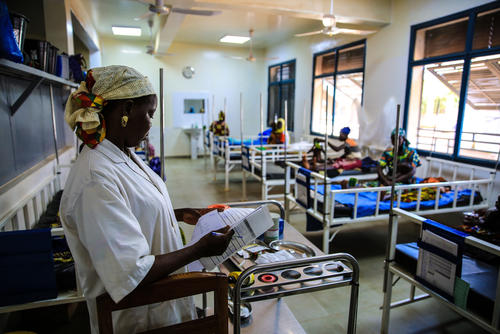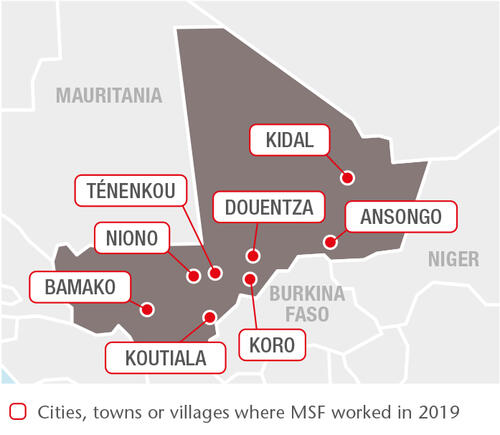
371,800
371,8
350,100
350,1
161,500
161,5

6,810
6,81
Médecins Sans Frontières (MSF) programmes around the country focus on improving access to healthcare for the most vulnerable people in both rural and urban areas.
Responding to a growing crisis in central Mali
Insecurity in central Mali has reached an unprecedented level, with an increase in clashes between the military and non-state armed groups, together with a rise in intercommunal violence. In March 2019, 160 people were killed in an attack allegedly perpetrated by a militia group, sparking a cycle of violent reprisals in the region.
We have teams working in Douentza and Ténenkou hospitals in Mopti region, and organising referrals from surrounding rural areas. In the area surrounding Douentza, we worked in three health centres and implemented a community-based programme to provide healthcare in 26 sites in villages most affected by violence. Around Ténenkou, we deployed mobile teams to around 40 villages to deliver general healthcare to nearly 15,000 patients. We expanded our activities in Koro, Bandiagara and Bankass to assist some of the people most affected by the escalating violence in the region, providing them with general healthcare, mental health support and relief items, such as blankets. In June, we opened a new programme dedicated to women and children under 15 in Niono, in Segou region. In addition to supporting the maternity and paediatric units at Niono hospital, we work in five outlying health centres. In 2019, we conducted 4,590 outpatient consultations.
Bringing healthcare closer to nomadic communities in the north
In Ansongo, Gao region, and in Kidal, north of Gao, we ensure that healthcare is available to nomadic communities by training community health workers to diagnose and treat the most common diseases affecting pregnant women and children under five. In 2019, our teams worked in 62 nomadic camps in Kidal and Ansongo regions.
We also have teams in a hospital and four health centres in Ansongo, providing medical care and psychological support for victims of violence, and in six health centres in and around Kidal.
Caring for cancer patients in Bamako
Since November 2018, we have been working with the Ministry of Health in Bamako to facilitate access to diagnosis and treatment (radiotherapy, surgery, chemotherapy) of cervical and breast cancer. In order to assist patients receiving treatment in the capital’s Point G University Hospital, most of whom are in the advanced stages of the disease, with few or no treatment options, we run free palliative care and support services in both the hospital and their homes. In 2019, we also trained healthcare staff and carried out rehabilitation works at the hospital in partnership with the health authorities.
Ten years of child healthcare in Koutiala
In the south, we support nutrition and paediatric services at Koutiala hospital through our newly built 185-bed paediatric care unit. Our teams also conduct preventive and curative activities in 36 health centres, especially during the seasonal malaria and malnutrition peaks. During the year, they conducted a total of 165,000 outpatient consultations.

















